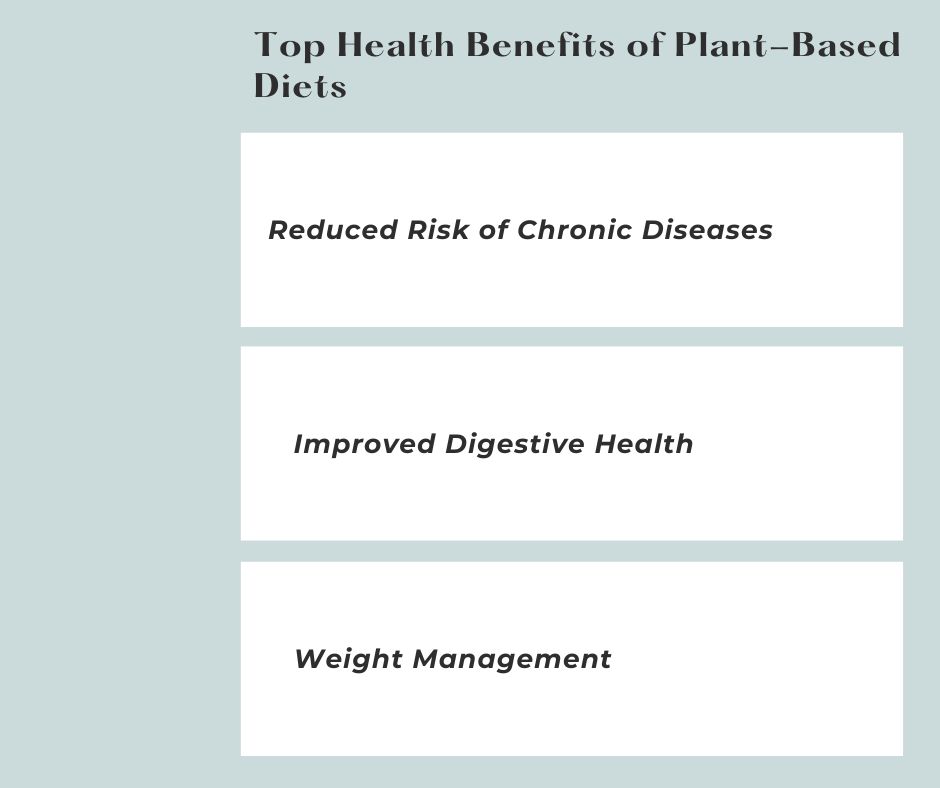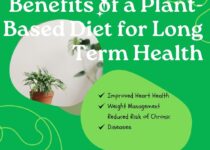The Rise of Plant-Based Diets Health Benefits and How to Get Started
Plant-based diets have surged in popularity across the USA, driven by growing awareness of their health benefits, environmental impact, and ethical considerations. From reducing the risk of chronic diseases to promoting sustainable living, plant-based eating is more than just a trend.it’s a lifestyle change. In this article, we’ll explore the health benefits of plant-based diets, how to transition to one, and tips for maintaining a balanced and nutritious diet.
What is a Plant-Based Diet?
A plant-based diet focuses on foods derived from plants, including fruits, vegetables, whole grains, nuts, seeds, and legumes. It minimizes or eliminates animal products like meat, dairy, and eggs. There are different levels of plant-based eating, from vegan (no animal products) to flexitarian (mostly plant-based with occasional animal products).
Top Health Benefits of Plant-Based Diets

Reduced Risk of Chronic Diseases
Plant-based diets are rich in fiber, antioxidants, and healthy fats, which help lower the risk of heart disease, diabetes, and certain cancers.
Improved Digestive Health
The high fiber content in plant-based foods promotes healthy digestion and prevents constipation.
Weight Management
Plant-based diets are typically lower in calories and saturated fats, making them effective for weight loss and maintenance.
Better Heart Health
By reducing cholesterol and blood pressure, plant-based diets support cardiovascular health.
Enhanced Energy Levels
Nutrient-dense plant foods provide sustained energy without the crashes associated with processed foods.
Environmental Benefits
Plant-based diets have a lower carbon footprint, making them a sustainable choice for the planet.
How to Transition to a Plant-Based Diet
Start Gradually
Begin by incorporating more plant-based meals into your diet, such as Meatless Mondays, and gradually increase the frequency.
Focus on Whole Foods
Choose whole, unprocessed plant foods like fruits, vegetables, whole grains, and legumes.
Experiment with Plant-Based Proteins
Incorporate protein-rich foods like beans, lentils, tofu, tempeh, and quinoa into your meals.
Explore New Recipes
Try plant-based versions of your favorite dishes, such as veggie burgers, lentil soups, or cauliflower rice.
Read Food Labels
Be mindful of processed plant-based products that may contain added sugars, sodium, or unhealthy fats.
Plan Balanced Meals
Ensure your diet includes a variety of nutrients by combining different plant-based food groups.
Tips for Maintaining a Balanced Plant-Based Diet
Include a Variety of Colors: Different colored fruits and vegetables provide a range of vitamins and minerals.
Don’t Forget Healthy Fats: Incorporate sources like avocados, nuts, seeds, and olive oil.
Supplement When Necessary: Consider supplements for nutrients like vitamin B12, iron, and omega-3s, which may be harder to obtain from plants.
Stay Hydrated: Drink plenty of water and herbal teas to support digestion and overall health.
Conclusion
Plant-based diets offer numerous health benefits, from reducing the risk of chronic diseases to promoting sustainable living. Whether you’re fully transitioning or simply incorporating more plant-based meals, this lifestyle change can improve your health and well-being. Start small, experiment with new foods, and enjoy the journey to a healthier you.
Frequently Asked Questions (FAQs)
- Can I get enough protein on a plant-based diet?
Yes, plant-based proteins like beans, lentils, tofu, and quinoa provide ample protein. Combining different sources ensures you get all essential amino acids.
- Is a plant-based diet suitable for children?
Yes, but it requires careful planning to ensure they get enough nutrients like calcium, iron, and vitamin B12. Consult a pediatrician or dietitian for guidance.
- Will I lose weight on a plant-based diet?
Many people lose weight on plant-based diets due to their lower calorie density and high fiber content, but results vary.
- What are the best plant-based sources of iron?
Lentils, chickpeas, spinach, tofu, and fortified cereals are excellent sources of iron. Pair them with vitamin C-rich foods to enhance absorption.
- Can I eat processed plant-based foods?
While convenient, processed plant-based foods should be consumed in moderation due to added sugars, sodium, and unhealthy fats.
- Do I need to take supplements on a plant-based diet?
Supplements like vitamin B12, vitamin D, and omega-3s may be necessary, especially for vegans. Consult a healthcare professional for personalized advice


